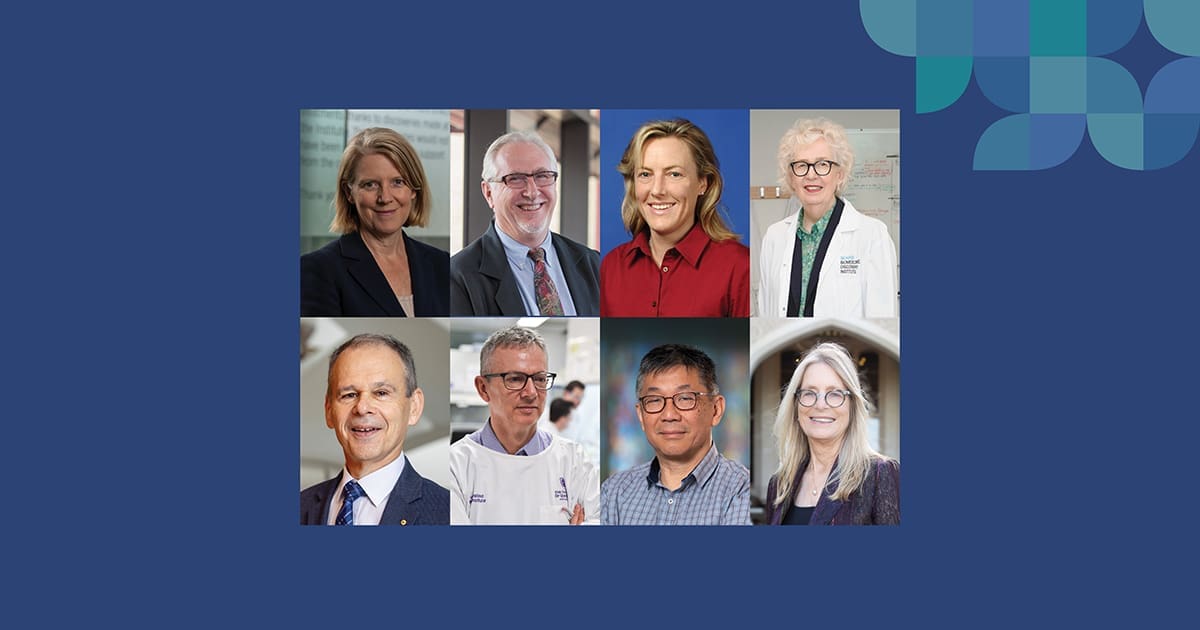Eight Australian Academy of Health and Medical Sciences Fellows have been recognised for their outstanding contributions to health and medical research with election to the Australian Academy of Science.
Professors David Adams, Gabrielle Belz, Helen Christensen, Jürgen Götz, David Huang, Christina Mitchell, Clare Scott and Anthony Weiss were announced as new Academy of Science Fellows on 22 May, and will be formally admitted to the academy in a ceremony on 2 and 3 September 2025.
We warmly congratulate them on their achievement.
Read the full list of new Academy of Science Fellows on their website, or learn more about our joint Fellows by reading their citations below.
Distinguished Professor David Adams FAHMS FAA
Professor David Adams is internationally recognised as a leader in membrane physiology and neuroscience research, with a focus on the function and modulation of membrane receptors and ion channels, primarily through molecular biology and electrophysiological recording techniques. Over the past 25 years, Professor Adams has characterised numerous peptides, particularly conotoxins derived from the venom of cone snails, as tools for studying ion channel structure and function, as well as potential therapeutics for treating chronic neuropathic and visceral pain. Professor Adams’s discovery of analgesic conotoxins that target G protein-coupled receptors, which in turn modulate the function of voltage-gated calcium and potassium channels, offers a promising approach for the development of non-opioid drugs for pain treatment.
Gabrielle Belz FAHMS FAA
Professor Gabrielle Belz is an immunologist whose work has provided seminal insights into cellular and molecular mechanisms that shape the immune system’s response to pathogen infections. Her work has uncovered the breadth of the responsiveness of anti-viral immune cells, the essential role of helper CD4 T cells in the generation of memory CD8 T cells and defined the antigen-presenting cells required for responses to pathogens and tissue antigens. Her work has also uncovered how innate cells collaborate with adaptive cells in a key immune checkpoint. Professor Belz’s work has provided fundamental knowledge identifying new elements of the functioning of the immune system that could be harnessed therapeutically.
Professor Helen Christensen AO FAHMS FAA FASSA
Professor Helen Christensen is widely regarded as a world leader in the field of digital mental health interventions. She pioneered many of the processes and strategies that are used internationally today. Trained as a clinical psychologist, she led the translation of traditional face-to-face psychological treatment to digital delivery. Through over 50 trials and cohort studies, Professor Christensen demonstrated the effectiveness of digital interventions. Relatedly, she has pioneered the science of digital phenotyping by which passive data collection (from smartphones) can monitor a person’s mental health. Overall, her digital developments have been used by millions of people globally, meaning that Professor Christensen has had an enormous global impact on mental health.
Professor Jürgen Götz FAA FAHMS
Professor Jürgen Götz is Endowed Chair of Dementia Research and Director of the Clem Jones Centre for Ageing Dementia Research at the Queensland Brain Institute (University of Queensland). After obtaining his PhD in the laboratory of Nobel Laureate Georges Koehler, he worked in academia and industry in the US and Switzerland, before relocating to Australia in 2005. He has made fundamental contributions to understanding the mechanisms of neurodegeneration in Alzheimer’s dementia. Professor Götz’s discoveries around low-intensity ultrasound as a modality for treating brain diseases led to significant funding, building a clinical ready device, a completed clinical trial and a start-up company
Professor David Huang FAA FAHMS
Professor David Huang is a biomedical researcher who made fundamental research discoveries on programmed cell suicide (apoptosis) that laid the foundations for the discovery and development of a novel class of anti-cancer drugs. Professor Huang made critical contributions towards revealing how BCL2, often overactive in blood cancers, and related proteins block cell death thereby uncovering how BCL2 could be targeted in cancer cells. In collaboration with industry partners, this work led to the development of venetoclax to target BCL2. Venetoclax has proven highly effective and is now approved in Australia and other jurisdictions for patients with certain types of leukaemias and lymphomas.
Professor Christina Mitchell AO FAHMS FAA
Professor Christina Mitchell has made fundamental discoveries in biochemistry in the field of intracellular signalling by characterising families of signal regulating enzymes, including the inositol-polyphosphate 5-phosphatases, and 4-phosphatases (INPP4A and B). Her laboratory demonstrated the regulation of phosphoinositide signalling by these enzymes, showing their intracellular location and revealing the substrate specificity of phosphoinositide phosphatases. Her group determined the 5-phosphatase catalytic domain that enabled identification of all ten 5-phosphatase family members and demonstrated their cellular roles in development, cell proliferation and cytoskeletal dynamics. Professor Mitchell has made substantive contributions to research leadership, building research excellence, and mentoring early career and women researchers.
Professor Clare Scott AM FAA FAHMS
Professor Clare Scott, an internationally recognised expert in gynaecological cancer research, is Laboratory Head, Walter and Eliza Hall Institute of Medical Research and Chair of Gynaecological Cancer, University of Melbourne. A clinician-scientist, her research into susceptibility and resistance to precision therapies for rare cancers, particularly rare ovarian cancers, has resulted in pivotal contributions to the development of the landscape changing, PARP inhibitor treatment. With conspicuous clinical trial leadership and the development of an internationally renowned resource of pre-clinical models, Professor Scott has also developed innovative national infrastructure, enabling access for Australians with rare cancers to expert clinical advice and research.
Professor Anthony Weiss AM FAHMS FAA FTSE
Professor Anthony Weiss is an outstanding multifaceted biomedical scientist, mentor and translational leader. He is the McCaughey Chair in Biochemistry and NHMRC Leadership Fellow at the University of Sydney, and the world leader in molecular studies of human tropoelastin and its assembly to make three-dimensional elastin protein biomaterials. His many international patents drove commercial success in one of Australia’s largest healthcare transactions. Professor Weiss’s many innovation awards include the Prime Minister’s Prize, NSW Premier’s Prize, Eureka Prize, Australian Academy of Technological Sciences & Engineering’s Clunies Ross Award, and Australian Academy of Science’s Ian Wark Medal.

